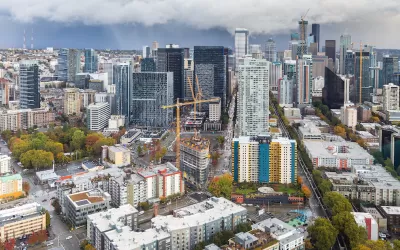Councilmembers who opposed the proposal say the fee would have slowed housing development and raised housing costs.

The Seattle City Council voted against a proposal that would have paved the way for a transportation impact fee that would have imposed a charge on new developments.
According to an article in The Registry, “The proposed ordinance aimed to pave the way for a transportation impact fee geared toward constructing sidewalks and other vital infrastructure. Developers expressed concerns that such fees would elevate housing costs, contributing to the council’s close vote against the measure.”
The article adds that the ordinance, which could come before the council again next year, did not immediately impose the fee, but “adjusted the comprehensive plan to outline potential strategies for its implementation.” However, housing advocates expressed concern that the fee could slow housing production and ultimately pass costs on to renters.
A transportation impact fee has been proposed in Seattle for over a decade. In an article in The Urbanist, Ryan Packer notes that “Seattle has long been an outlier in Washington in not having a transportation impact fee program, with over 70 other jurisdictions having fees of certain sizes in place, in addition to impact fees for other infrastructure like schools and parks.”
FULL STORY: Seattle City Council Votes Against Implementation of Transportation Impact Fee on Commercial Development

Planetizen Federal Action Tracker
A weekly monitor of how Trump’s orders and actions are impacting planners and planning in America.

Map: Where Senate Republicans Want to Sell Your Public Lands
For public land advocates, the Senate Republicans’ proposal to sell millions of acres of public land in the West is “the biggest fight of their careers.”

Restaurant Patios Were a Pandemic Win — Why Were They so Hard to Keep?
Social distancing requirements and changes in travel patterns prompted cities to pilot new uses for street and sidewalk space. Then it got complicated.

Platform Pilsner: Vancouver Transit Agency Releases... a Beer?
TransLink will receive a portion of every sale of the four-pack.

Toronto Weighs Cheaper Transit, Parking Hikes for Major Events
Special event rates would take effect during large festivals, sports games and concerts to ‘discourage driving, manage congestion and free up space for transit.”

Berlin to Consider Car-Free Zone Larger Than Manhattan
The area bound by the 22-mile Ringbahn would still allow 12 uses of a private automobile per year per person, and several other exemptions.
Urban Design for Planners 1: Software Tools
This six-course series explores essential urban design concepts using open source software and equips planners with the tools they need to participate fully in the urban design process.
Planning for Universal Design
Learn the tools for implementing Universal Design in planning regulations.
Heyer Gruel & Associates PA
JM Goldson LLC
Custer County Colorado
City of Camden Redevelopment Agency
City of Astoria
Transportation Research & Education Center (TREC) at Portland State University
Camden Redevelopment Agency
City of Claremont
Municipality of Princeton (NJ)





























